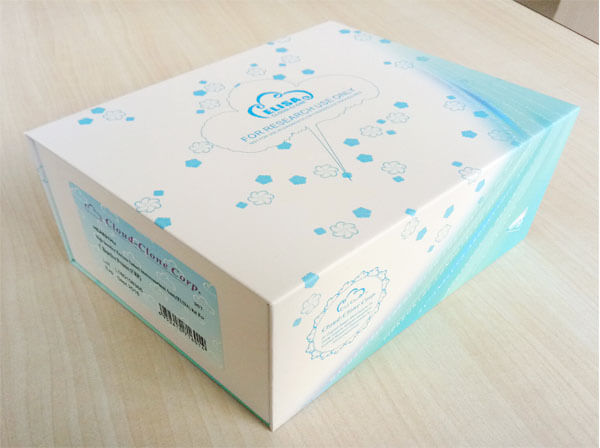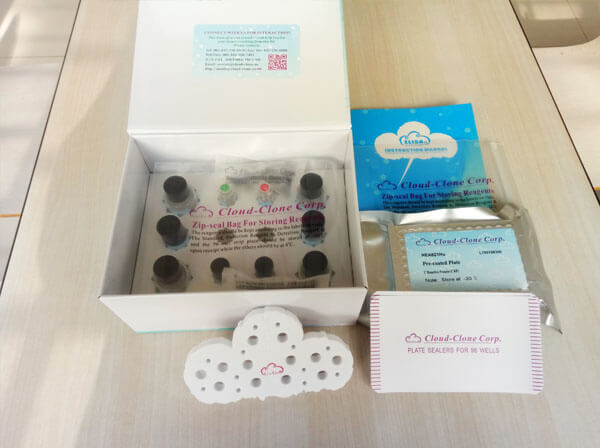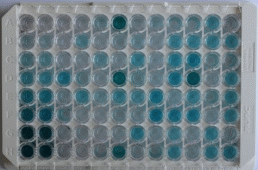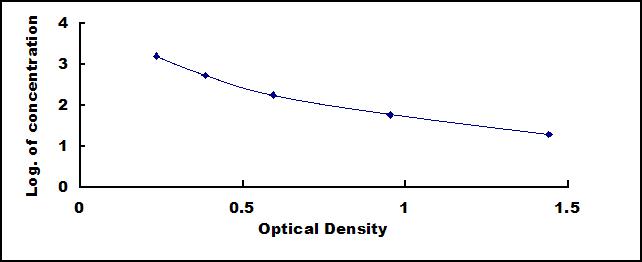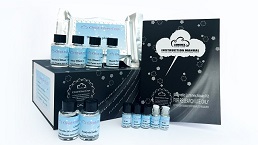High Sensitive ELISA Kit for Advanced Glycation End Product (AGE) 

AGEs; Advanced Glycation End Products
- UOM
- FOB US$ 547.00 US$ 782.00 US$ 3,519.00 US$ 6,647.00 US$ 54,740.00
- Quantity
Overview
Properties
- Product No.HEB353Ge
- Organism SpeciesPan-species (General) Same name, Different species.
- ApplicationsEnzyme-linked immunosorbent assay for Antigen Detection.
Research use only - DownloadInstruction Manual
- CategoryMetabolic pathwayEndocrinologyCardiovascular biologyHormone metabolism
Sign into your account
Share a new citation as an author
Upload your experimental result
Review

Contact us
Please fill in the blank.
Recovery
Matrices listed below were spiked with certain level of recombinant High Sensitive Advanced Glycation End Product (AGE) and the recovery rates were calculated by comparing the measured value to the expected amount of High Sensitive Advanced Glycation End Product (AGE) in samples.
| Matrix | Recovery range (%) | Average(%) |
| serum(n=5) | 79-99 | 95 |
| EDTA plasma(n=5) | 86-93 | 90 |
| heparin plasma(n=5) | 85-101 | 94 |
Precision
Intra-assay Precision (Precision within an assay): 3 samples with low, middle and high level High Sensitive Advanced Glycation End Product (AGE) were tested 20 times on one plate, respectively.
Inter-assay Precision (Precision between assays): 3 samples with low, middle and high level High Sensitive Advanced Glycation End Product (AGE) were tested on 3 different plates, 8 replicates in each plate.
CV(%) = SD/meanX100
Intra-Assay: CV<10%
Inter-Assay: CV<12%
Linearity
The linearity of the kit was assayed by testing samples spiked with appropriate concentration of High Sensitive Advanced Glycation End Product (AGE) and their serial dilutions. The results were demonstrated by the percentage of calculated concentration to the expected.
| Sample | 1:2 | 1:4 | 1:8 | 1:16 |
| serum(n=5) | 80-99% | 96-105% | 94-102% | 93-105% |
| EDTA plasma(n=5) | 78-101% | 84-101% | 99-105% | 90-102% |
| heparin plasma(n=5) | 98-105% | 78-89% | 82-89% | 79-95% |
Stability
The stability of kit is determined by the loss rate of activity. The loss rate of this kit is less than 5% within the expiration date under appropriate storage condition.
To minimize extra influence on the performance, operation procedures and lab conditions, especially room temperature, air humidity, incubator temperature should be strictly controlled. It is also strongly suggested that the whole assay is performed by the same operator from the beginning to the end.
Reagents and materials provided
| Reagents | Quantity | Reagents | Quantity |
| Pre-coated, ready to use 96-well strip plate | 1 | Plate sealer for 96 wells | 4 |
| Standard | 2 | Standard Diluent | 1×20mL |
| Detection Reagent A | 1×120µL | Assay Diluent A | 1×12mL |
| Detection Reagent B | 1×120µL | Assay Diluent B | 1×12mL |
| TMB Substrate | 1×9mL | Stop Solution | 1×6mL |
| Wash Buffer (30 × concentrate) | 1×20mL | Instruction manual | 1 |
Assay procedure summary
1. Prepare all reagents, samples and standards;
2. Add 50µL standard or sample to each well.
And then add 50µL prepared Detection Reagent A immediately.
Shake and mix. Incubate 1 hour at 37°C;
3. Aspirate and wash 3 times;
4. Add 100µL prepared Detection Reagent B. Incubate 30 minutes at 37°C;
5. Aspirate and wash 5 times;
6. Add 90µL Substrate Solution. Incubate 10-20 minutes at 37°C;
7. Add 50µL Stop Solution. Read at 450 nm immediately.

Test principle
This assay employs the competitive inhibition enzyme immunoassay technique. An antibody specific to AGE has been pre-coated onto a microplate. A competitive inhibition reaction is launched between biotin labeled AGE and unlabeled AGE (Standards or samples) with the pre-coated antibody specific to AGE. After incubation the unbound conjugate is washed off. Next, avidin conjugated to Horseradish Peroxidase (HRP) is added to each microplate well and incubated. The amount of bound HRP conjugate is reverse proportional to the concentration of AGE in the sample. After addition of the substrate solution, the intensity of color developed is reverse proportional to the concentration of AGE in the sample.
Giveaways
Increment services
Citations
- Threshold serum concentrations of tumour necrosis factor alpha (TNFα) as a potential marker of the presence of microangiopathy in children and adolescents with type 1 diabetes mellitus (T1DM)PubMed: S0198885912005642
- A long-standing hyperglycaemic condition impairs skin barrier by accelerating skin ageing processPubMed: 22017743
- Daily intake of vitamin D- or calcium-vitamin D-fortified Persian yogurt drink (doogh) attenuates diabetes-induced oxidative stress: evidence for antioxidative properties of vitamin D.Pubmed: 23829785
- Association of RAGE gene polymorphism with circulating AGEs level and paraoxonase activity in relation to macro-vascular complications in Indian type 2 diabetes mellitus patients.Pubmed: 23721855
- Lipoprotein-associated phospholipase A2 and AGEs are associated with cardiovascular risk factors in women with history of gestational diabetes mellitus.Pubmed:24397392
- Role of advanced glycation end product (AGE)-induced receptor (RAGE) expression in diabetic vascular complicationsPubmed:24984291
- Nitroxides prevent protein glycoxidation in vitro.Pubmed:25363554
- Serum advanced glycation end products are associated with insulin resistance in male nondiabetic patients with obstructive sleep apneaPubmed:25566941
- Ascorbic acid and protein glycationPubMed: 26163454
- Establishment of a rabbit model to study the influence of advanced glycation end products accumulation on osteoarthritis and the protective effect of pioglitazonePubMed: 26321377
- Relationship between serum levels of endogenous secretory RAGE and blood pressure in male nondiabetic patients with obstructive sleep apneaPubMed: 25994997
- Glycation of bovine serum albumin by ascorbatePubMed: 26202868
- Impact of morbid obesity and bariatric surgery on antioxidant/oxidant balance of the unstimulated and stimulated human salivaPubMed: 26608886
- Inhibition of Advanced Glycation Endproduct Formation by Lotus Seedpod Oligomeric Procyanidins through RAGE-MAPK Signaling and NF-κB Activation in High-Fat-Diet Rats.PubMed: 26207852
- ADVANCED GLYCATION END PRODUCTS'RESPONSE TO RESISTANCE TRAINING IN POSTMENOPAUSAL WOMEN WITH TYPE II DIABETES140251:
- Effects of edible bird's nest on hippocampal and cortical neurodegeneration in ovariectomized ratsPubMed: 25920003
- Beneficial effects of urine-derived stem cells on fibrosis and apoptosis of myocardial, glomerular and bladder cellsPubmed:26952874
- Effects of S-Nitroso-N-Acetyl-Penicillamine (SNAP) on Inflammation, Lung Tissue Apoptosis and iNOS Activity in a Rabbit Model of Acute Lung InjuryPubmed:27334732
- The Receptor for Advanced Glycation End Products (Rage) and Its Ligands in Plasma and InfrainCavia (Guinea pig )inal Bypass VeinPubmed:26905625
- Berberine exerts renoprotective effects by regulating the AGEs-RAGE signaling pathway in mesangial cells during diabetic nephropathy.pubmed:28087385
- Inhibition of Methylglyoxal-Induced AGEs/RAGE Expression Contributes to Dermal Protection by N-Acetyl-L-Cysteine.pubmed:28214842
- Glutathione is the main endogenous inhibitor of protein glycation.pubmed:28218612
- Establishment of a rabbit model to study the influence of advanced glycation end productsaccumulation on osteoarthritis and the protective effect of pioglitazone.pubmed:26321377
- Advanced glycation end products promote VEGF expression and thus choroidal neovascularization via Cyr61-PI3K/AKT signaling pathwaypubmed:29097668
- Lychee seed extract protects against neuronal injury and improves cognitive function in rats with type II diabetes mellitus with cognitive impairmentpubmed:29138799
- (台灣農業研究67 (4): 355-364) 香菇柄水萃物改善糖尿病降低阿茲海默氏症罹病風險初探
- Altered Mineral Metabolism and Disequilibrium Between Calcification Promoters and Inhibitors in Chronic Hemodialysis PatientsPubmed: 30847765
- Cellular Metabolomics Reveal the Mechanism Underlying the Anti-Atherosclerotic Effects of Aspirin Eugenol Ester on Vascular Endothelial DysfunctionPubmed: 31261711
- Fushiming Capsule Attenuates Diabetic Rat Retina Damage via Antioxidation and Anti-Inflammation
- Effect of Advanced Glycation End Products on the Progression of Alzheimer's DiseasePubmed: 31561370
- Protective effect of vanillin on diabetic nephropathy by decreasing advanced glycation end products in ratsPubmed: 31759039
- Supplementation with Korean Red Ginseng Improves Current Perception Threshold in Korean Type 2 Diabetes Patients: A Randomized, Double-Blind, Placebo …Pubmed: 32025522
- A New Insight into Meloxicam: Assessment of Antioxidant and Anti-Glycating Activity in In Vitro StudiesPubmed: 32927809
- Advanced glycation end products enhance macrophage polarization to the M1 phenotype via the HIF-1α/PDK4 pathwayPubmed: 32464167
- The effect of Korean Red Ginseng on sarcopenia biomarkers in type 2 diabetes patientsPubmed: 32470863
- The Role of PPARγ in Hyperglycemia-induced Deleterious Effect on Chondrocytes
- Young and Undamaged rMSA Improves the Healthspan and Lifespan of Mice34439857
- Dietary Advanced Glycation End Products Shift the Gut Microbiota Composition and Induce Insulin Resistance in MicePubmed:35210793



